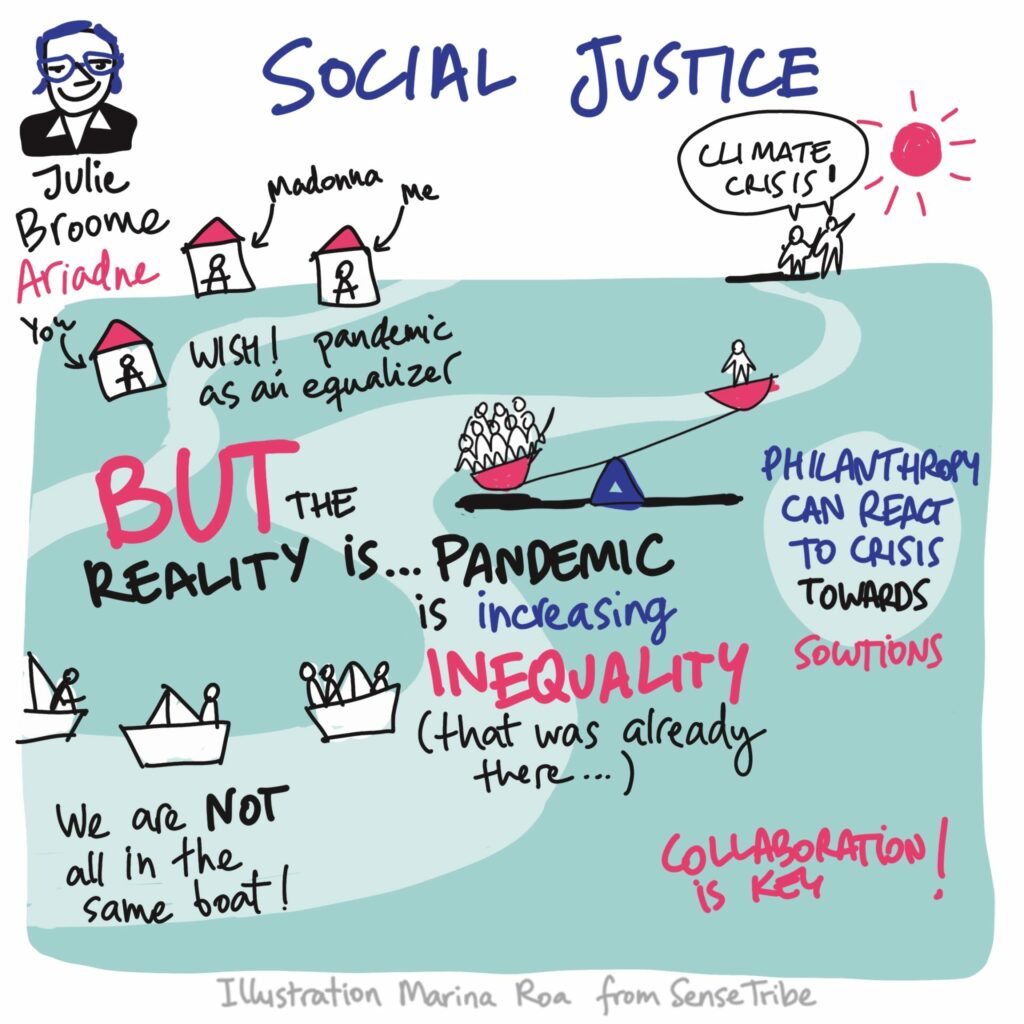Julie Broome: Navigating social justice – are we all on the same boat?
At the beginning of the pandemic, back in April last year, when many countries across the globe, and certainly most of Europe, were in lockdown, a friend of mine said to me that he loved thinking about the fact that he and Madonna were both basically in the same boat. With most people stuck at home, he and Madonna were more or less living the same life for the first time ever, and he found the equalizing aspect of the lockdown exciting and even a little satisfying. Pop stars were just as powerless as the rest of us.
This sense of solidarity was common in the first few weeks or even months of the pandemic. But now, almost a year in, it’s clear that people are experiencing the pandemic and the restrictions in very different ways.
Some people can work from home while others cannot.
Some people, often women, are home-schooling children while trying to hold down a job.
Some students can easily access online schooling while others don’t have a computer or can’t afford home internet.
Some people are enjoying lockdown evenings with their families, while some are locked down with their abusers.
Some people have saved money during the lockdowns by cooking at home while others are now struggling to put food on the table because of lost income.

In November, the World Bank reported that the COVID-19 pandemic was likely to push between 88 and 115 million people globally into extreme poverty. Meanwhile, it was reported in October that the world’s billionaires had increased their wealth by a quarter between April and July 2020, and that their collective wealth had hit a record high at $10.2 trillion.
So are we all in the same boat, really? Some of us are riding out this storm on yachts while others are clinging to pieces of driftwood.
As a philanthropic sector, we have an opportunity, and I might even go so far as to say a responsibility, to try to address the inequalities that have been amplified by this pandemic. I say amplified because COVID didn’t create these inequalities – they have long been in existence, but they were easier to ignore, and the past year has made it impossible not to see them as the gulf between rich and poor has gotten so much wider.
And of course it’s not about wealth alone. One’s experiences over the past year will differ depending on a wide range of factors, including, among others, class, education, gender, race, and whether one lives in an urban area or rurally. There are many layers to the inequities in our societies.
This is a moment for us to think collectively about how we can address these challenges, which are too huge for anyone to fix alone. The solutions will need to be structural and long term, because it’s not just about getting through this crisis but looking ahead to the climate crisis that looms on the horizon. The same inequities that we’re experiencing now influence who is most affected by climate change and how.
Philanthropic funds may pale in comparison with those of governments and multilateral institutions, but foundations have an important role to play in this moment. They can hold the space for development of a vision for the future of Europe and the societies we want to build as we emerge from this crisis. They can fund innovation and experimentation in the search for solution. They can support civil society to advocate for the policies needed to protect the most vulnerable, including the next generation, whose future has been seriously jeopardized. And as philanthropic infrastructure organisations, we can facilitate the kind of collaboration that is going to be critical as we move forward.
In 2020, we saw how quickly and nimbly philanthropy can respond in a crisis: foundations created rapid response funds, they relaxed funding requirements, they listened to the needs of the organisations working on the ground. The Unitus Europe Hub was created to help pool emergency funds for distribution across Europe. In the UK, the Respond and Adapt Programme pooled over £2m that was distributed to refugee and migrant organisations affected by COVID-19. The European AI Fund, a collaboration among seven private foundations, was launched last year with the aim of strengthening civil society’s ability to actively shape the role and form that Europe’s digital transformation should take. This wasn’t a direct response to COVID but the need was certainly accelerated by the pandemic. These are all examples of how the sector can really come together to make a difference when it matters. And although the initial sense of emergency may have passed, there is value in maintaining the mindset of a joint endeavour as we move from emergency response to long term visioning and sustainability. Let’s not stop thinking and working together just because the initial moment of panic has passed.
The world has changed more rapidly over the past year than at probably any point since the end of world war two. If we’re going to make the most of this opportunity to shape a future that is built on equality, fairness, and inclusion, then we have to face this challenge together.
